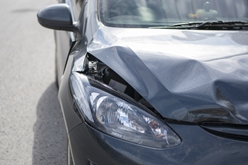
Whether you suffered injuries in an automobile accident caused by a negligent driver or not, you will probably have to deal with damage to your automobile. The negligent driver is responsible for compensating you for your injuries and for the property damage to your vehicle. If you have collision coverage on your car, you will have to decide whether to file a claim for car repairs under your own policy or to file a claim with the negligent driver’s insurance company.
Even if you do not plan to file a claim with your own insurance company, you want to notify the company of the accident to fulfill your contractual duties and to preserve your right to file a claim if you later decide this is your best option. Whichever insurance company you deal with, your claim for the damage to your vehicle could be paid as follows:
- Repairing your vehicle if the damage was not severe enough to require your vehicle to be replaced
- Totaling your vehicle if your vehicle is considered a “total loss”
- Paying you a diminished value claim
Getting Your Vehicle Repaired
Once you file your claim, the insurance adjuster will arrange for an inspection of your vehicle to determine if it can be repaired or should be replaced. Unless the adjuster tells you to obtain an estimate, you do not need to do this. He will either arrange for you to take your vehicle to an authorized inspection facility or have someone come to your location to inspect your car. Once the inspection is completed and the adjuster makes a decision to authorize repairs, you can get your vehicle repaired. Some important points about your rights include:
- In Georgia, you have the right to pick your own repair shop to take your vehicle to be repaired. However, the amount the insurance company agrees to pay may not be the same as the estimate from your mechanic.
- Find out if the shop that you plan to use offers a warranty. If so, get a copy of the warranty in writing.
- Your insurance company could try to convince you to get your vehicle repaired at a preferred repair shop that they have a relationship with. These are often referred to as Direct Referral Program Contracts, and the insurance company could receive a financial incentive for referring a lot of its business to this shop. You do not have to agree to use this repair facility and should only do so if you are confident about the quality of its work.
- Ask that original equipment manufacturer (OEM) parts be used if possible. Watch out for the use of defective junk parts or economy parts—body parts manufactured by a company other than the original manufacturer. However, the insurance contract may allow the insurance company to use economy parts.
What Happens When Your Vehicle Is Totaled?
If the cost of repairing your vehicle is more than it is worth, the insurance company will total it and instead settle your claim by paying you the replacement cost. Your vehicle could also be totaled as a constructive total loss if it could not be made safe even if it was repaired. Here’s what you need to know about these claims:
- You are generally entitled to the Actual Cash Value (ACV) of your vehicle, which is the reasonable amount necessary to replace your vehicle with a comparable used one, plus sales tax, registration, and title fees.
- If you purchased Replacement Cash Value (RCV) coverage as part of your collision coverage and make a claim under your policy, you could receive the value to replace your vehicle with a comparable new vehicle.
- When the insurance adjuster advises you on what the insurance company has determined as your ACV, you want to ask him a lot of questions to be certain all your accessories and upgrades are included in the value of your vehicle.
- You can do your research by checking the value of your vehicle on Internet sites such as Kelly Blue Book and Edmunds. You should also research local ads because the ACV and RCV are to be based on local prices.
- If you want to keep your vehicle, the insurance company may allow you to do this, but may subtract the salvage value from the value of your car in settling your claim.
Additional reading: auto repair lawyers
When Can You Make a Diminished Value Claim?
Even if your car is repaired perfectly, it will be worth less than if it was not involved in an accident. You have a right to be compensated for this reduction in value, and this is known as a Diminished Value Claim. This is a payment you would receive in addition to the car repair costs. Not everyone is entitled to this type of payment. In general, your vehicle must meet these requirements:
- Your vehicle must have been worth at least $5,000 before your crash.
- Your vehicle must have needed repairs costing at least $1,500.
- Your vehicle must have been no more than eight years old at the time of the accident.
- Your vehicle must not have a salvage title, and it can never have been declared a total loss.
- You must still be within the statute of limitations to pursue your claim.
Property damage claims can be confusing and difficult to settle for what you really deserve. Unlike some other law firms, Brauns Law Accident Injury Lawyers, PC handles property damage claims for our clients who are involved in car accidents. If you have questions about your property damage claim or need help negotiating your settlement, call us to schedule your free consultation.
Related Links:














